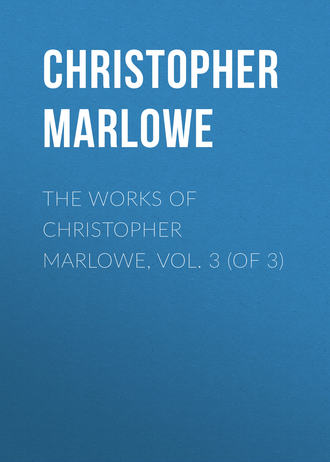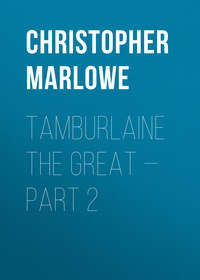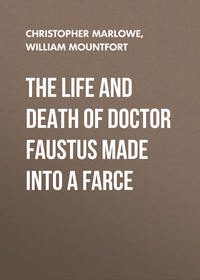 полная версия
полная версияThe Works of Christopher Marlowe, Vol. 3 (of 3)
THE SIXTH SESTIAD
The Argument of the Sixth SestiadLeucote flies to all the Winds,And from the Fates their outrage blinds,113That Hero and her love may meet.Leander, with Love's complete fleetManned in himself, puts forth to seas;When straight the ruthless Destinies,With, Até, stir the winds to warUpon the Hellespont: their jarDrowns poor Leander. Hero's eyes,Wet witnesses of his surprise,Her torch blown out, grief casts her downUpon her love, and both doth drown:In whose just ruth the god of seasTransforms them to th' Acanthides.No longer could the Day nor DestiniesDelay the Night, who now did frowning riseInto her throne; and at her humorous breastsVisions and Dreams lay sucking: all men's restsFell like the mists of death upon their eyes,Day's too-long darts so kill'd their faculties.The Winds yet, like the flowers, to cease began;For bright Leucote, Venus' whitest swan,That held sweet Hero dear, spread her fair wings,Like to a field of snow, and message bringsFrom Venus to the Fates, t'entreat them layTheir charge upon the Winds their rage to stay,That the stern battle of the seas might cease,And guard Leander to his love in peace.The Fates consent;—ay me, dissembling Fates!They showed their favours to conceal their hates,And draw Leander on, lest seas too highShould stay his too obsequious destiny:Who114 like a fleering slavish parasite,In warping profit or a traitorous sleight,Hoops round his rotten body with devotes,And pricks his descant face full of false notes;Praising with open throat, and oaths as foulAs his false heart, the beauty of an owl;Kissing his skipping hand with charmèd skips,That cannot leave, but leaps upon his lipsLike a cock-sparrow, or a shameless queanSharp at a red-lipp'd youth, and naught doth meanOf all his antic shows, but doth repairMore tender fawns,115 and takes a scatter'd hairFrom his tame subject's shoulder; whips and callsFor everything he lacks; creeps 'gainst the wallsWith backward humbless, to give needless way:Thus his false fate did with Leander play.First to black Eurus flies the white Leucote(Born 'mongst the negroes in the Levant sea,On whose curl'd head[s] the glowing sun doth rise),And shows the sovereign will of Destinies,To have him cease his blasts; and down he lies.Next, to the fenny Notus course she holds,And found him leaning, with his arms in folds,Upon a rock, his white hair full of showers;And him she chargeth by the fatal powers,To hold in his wet cheeks his cloudy voice.To Zephyr then that doth in flowers rejoice:To snake-foot Boreas next she did remove,And found him tossing of his ravished love,116To heat his frosty bosom hid in snow;Who with Leucote's sight did cease to blow.Thus all were still to Hero's heart's desire;Who with all speed did consecrate a fireOf flaming gums and comfortable spice,To light her torch, which in such curious priceShe held, being object to Leander's sight,That naught but fires perfumed must give it light.She loved it so, she griev'd to see it burn,Since it would waste, and soon to ashes turn:Yet, if it burned not, 'twere not worth her eyes;What made it nothing, gave it all the prize.Sweet torch, true glass of our society!What man does good, but he consumes thereby?But thou wert loved for good, held high, given show;Poor virtue loathed for good, obscured, held low:Do good, be pined,—be deedless good, disgraced;Unless we feed on men, we let them fast.Yet Hero with these thoughts her torch did spend:When bees make wax, Nature doth not intendIt should be made a torch; but we, that knowThe proper virtue of it, make it so,And, when 'tis made, we light it: nor did NaturePropose one life to maids; but each such creatureMakes by her soul the best of her free117 state,Which without love is rude, disconsolate,And wants love's fire to make it mild and bright,Till when, maids are but torches wanting light.Thus 'gainst our grief, not cause of grief, we fight:The right of naught is glean'd, but the delight.Up went she: but to tell how she descended,Would God she were dead, or my verse ended!She was the rule of wishes, sum, and end,For all the parts that did on love depend:Yet cast the torch his brightness further forth;But what shines nearest best, holds truest worth.Leander did not through such tempests swimTo kiss the torch, although it lighted him:But all his powers in her desires awakèd,Her love and virtues clothed him richly naked.Men kiss but fire that only shows pursue;Her torch and Hero, figure show and virtue.Now at opposed Abydos naught was heardBut bleating flocks, and many a bellowing herd,Slain for the nuptials; cracks of falling woods;Blows of broad axes; pourings out of floods.The guilty Hellespont was mix'd and stainedWith bloody torrents118 that the shambles rained;Not arguments of feast, but shows that bled,Foretelling that red night that followèd.More blood was spilt, more honours were addrest,Than could have gracèd any happy feast;Rich banquets, triumphs, every pomp employsHis sumptuous hand; no miser's nuptial joys.Air felt continual thunder with the noiseMade in the general marriage-violence;And no man knew the cause of this expense,But the two hapless lords, Leander's sire,And poor Leander, poorest where the fireOf credulous love made him most rich surmis'd:As short was he of that himself119 he prized,As is an empty gallant full of form,That thinks each look an act, each drop a storm,That falls from his brave breathings; most brought upIn our metropolis, and hath his cupBrought after him to feasts; and much palm bearsFor his rare judgment in th' attire he wears;Hath seen the hot Low-Countries, not their heat,Observes their rampires and their buildings yet;And, for your sweet discourse with mouths, is heardGiving instructions with his very beard;Hath gone with an ambassador, and beenA great man's mate in travelling, even to Rhene;And then puts all his worth in such a faceAs he saw brave men make, and strives for graceTo get his news forth: as when you descryA ship, with all her sail contends to flyOut of the narrow Thames with winds unapt,Now crosseth here, then there, then this way rapt,And then hath one point reach'd, then alters all,And to another crookèd reach doth fallOf half a bird-bolt's120 shoot, keeping more coilThan if she danc'd upon the ocean's toil;So serious is his trifling company,In all his swelling ship of vacantryAnd so short of himself in his high thoughtWas our Leander in his fortunes brought,And in his fort of love that he thought won;But otherwise he scorns comparison.O sweet Leander, thy large worth I hideIn a short grave! ill-favour'd storms must chideThy sacred favour;121 I in floods of inkMust drown thy graces, which white papers drink,Even as thy beauties did the foul black seas;I must describe the hell of thy decease,That heaven did merit: yet I needs must seeOur painted fools and cockhorse peasantryStill, still usurp, with long lives, loves, and lust,The seats of Virtue, cutting short as dustHer dear-bought issue: ill to worse converts,And tramples in the blood of all deserts.Night close and silent now goes fast beforeThe captains and the soldiers to the shore,On whom attended the appointed fleetAt Sestos' bay, that should Leander meet,Who feigned he in another ship would pass:Which must not be, for no one mean there wasTo get his love home, but the course he took.Forth did his beauty for his beauty look,And saw her through her torch, as you beholdSometimes within the sun a face of gold,Formed in strong thoughts, by that tradition's forceThat says a god sits there and guides his course.His sister was with him; to whom he show'dHis guide by sea, and said, "Oft have you view'dIn one heaven many stars, but never yetIn one star many heavens till now were met.See, lovely sister! see, now Hero shines,No heaven but her appears; each star repines,And all are clad in clouds, as if they mournedTo be by influence of earth out-burned.Yet doth she shine, and teacheth Virtue's trainStill to be constant in hell's blackest reign,Though even the gods themselves do so entreat themAs they did hate, and earth as she would eat them."Off went his silken robe, and in he leapt,Whom the kind waves so licorously cleapt,122Thickening for haste, one in another, so,To kiss his skin, that he might almost goTo Hero's tower, had that kind minute lasted.But now the cruel Fates with Até hastedTo all the winds, and made them battle fightUpon the Hellespont, for either's rightPretended to the windy monarchy;And forth they brake, the seas mixed with the sky,And tossed distressed Leander, being in hell,As high as heaven: bliss not in height doth dwell.The Destinies sate dancing on the waves,To see the glorious Winds with mutual bravesConsume each other: O, true glass, to seeHow ruinous ambitious statists beTo their own glories! Poor Leander criedFor help to sea-born Venus she denied;To Boreas, that, for his Atthæa's123 sakeHe would some pity on his Hero take,And for his own love's sake, on his desires;But Glory never blows cold Pity's fires.Then call'd he Neptune, who, through all the noise,Knew with affright his wreck'd Leander's voice,And up he rose; for haste his forehead hit'Gainst heaven's hard crystal; his proud waves he smitWith his forked sceptre, that could not obey;Much greater powers than Neptune's gave them sway.They loved Leander so, in groans they brakeWhen they came near him; and such space did take'Twixt one another, loath to issue on,That in their shallow furrows earth was shown,And the poor lover took a little breath:But the curst Fates sate spinning of his deathOn every wave, and with the servile WindsTumbled them on him. And now Hero finds,By that she felt, her dear Leander's state:She wept, and prayed for him to every Fate;And every Wind that whipped her with her hairAbout the face, she kissed and spake it fair,Kneeled to it, gave it drink out of her eyesTo quench his thirst: but still their crueltiesEven her poor torch envied, and rudely beatThe baiting124 flame from that dear food it eat;Dear, for it nourish'd her Leander's life;Which with her robe she rescued from their strife;But silk too soft was such hard hearts to break;And she, dear soul, even as her silk, faint, weak,Could not preserve it; out, O, out it went!Leander still call'd Neptune, that now rentHis brackish curls, and tore his wrinkled face,Where tears in billows did each other chase;And, burst with ruth, he hurl'd his marble maceAt the stern Fates: it wounded LachesisThat drew Leander's thread, and could not missThe thread itself, as it her hand did hit,But smote it full, and quite did sunder it.The more kind Neptune raged, the more he razedHis love's life's fort, and kill'd as he embraced:Anger doth still his own mishap increase;If any comfort live, it is in peace.O thievish Fates, to let blood, flesh, and sense,Build two fair temples for their excellence,To robe it with a poisoned influence!Though souls' gifts starve, the bodies are held dearIn ugliest things; sense-sport preserves a bear:But here naught serves our turns: O heaven and earth,How most-most wretched is our human birth!And now did all the tyrannous crew depart,Knowing there was a storm in Hero's heart,Greater than they could make, and scorn'd their smart.She bow'd herself so low out of her tower,That wonder 'twas she fell not ere her hour,With searching the lamenting waves for him:Like a poor snail, her gentle supple limbHung on her turret's top, so most downright,As she would dive beneath the darkness quite,To find her jewel;—jewel!—her Leander,A name of all earth's jewels pleas'd not herLike his dear name: "Leander, still my choice,Come naught but my Leander! O my voice,Turn to Leander! henceforth be all sounds,Accents and phrases, that show all griefs' wounds,Analyzed in Leander! O black change!Trumpets, do you, with thunder of your clange,Drive out this change's horror! My voice faints:Where all joy was, now shriek out all complaints!"Thus cried she; for her mixèd soul could tellHer love was dead: and when the Morning fellProstrate upon the weeping earth for woe,Blushes, that bled out of her cheeks, did showLeander brought by Neptune, bruis'd and tornWith cities' ruins he to rocks had worn,To filthy usuring rocks, that would have blood,Though they could get of him no other good.She saw him, and the sight was much-much moreThan might have serv'd to kill her: should her storeOf giant sorrows speak?—Burst,—die,—bleed,And leave poor plaints to us that shall succeed.She fell on her love's bosom, hugged it fast,And with Leander's name she breathed her last.Neptune for pity in his arms did take them,Flung them into the air, and did awake themLike two sweet birds, surnam'd th' Acanthides,Which we call Thistle-warps, that near no seasDare ever come, but still in couples fly,And feed on thistle-tops, to testifyThe hardness of their first life in their last;The first, in thorns of love, that sorrows past:And so most beautiful their colours show,As none (so little) like them; her sad browA sable velvet feather covers quite,Even like the forehead-cloth that, in the night,Or when they sorrow, ladies use125 to wear:Their wings, blue, red, and yellow, mixed appear:Colours that, as we construe colours, paintTheir states to life;—the yellow shows their saint,The dainty126 Venus, left them; blue their truth;The red and black, ensigns of death and ruth.And this true honour from their love-death sprung,—They were the first that ever poet sung.127OVID'S ELEGIES
All the old editions of Marlowe's translation of the Amores are undated, and bear the imprint Middleburgh (in various spellings). It is probable that the copy which Mr. Charles Edmonds discovered at Lamport Hall, Northamptonshire (the seat of Sir Charles Isham, Bart.), is the earliest of extant editions. The title-page of this edition is—Epigrammes and Elegies By I. D. and C. M. At Middleborugh 12mo. After the title-page come the Epigrammata, which are signed at the end "I. D." (the initials of Sir John Davies). Following the Epigrammata is a copy of verses headed Ignoto, and then comes a second title-page—Certaine of Ovid's Elegies. By C. Marlowe. At Middleborough. In his preface to a facsimile reprint of the little volume, Mr. Edmonds states his conviction that this edition, notwithstanding the imprint Middleborough, was issued at London from the press of W. Jaggard, who in 1599 printed the Passionate Pilgrime. He grounds his opinion not only on the character of the type and of the misprints, but on the fact that there would be no need for the book to be printed abroad in the first instance. It was not (he thinks) until after June 1599—when (with other books) it was condemned by Archbishop Whitgift to be burnt—that recourse was had to the expedient of reprinting it at Middleburgh. In the notes I refer to this edition as Isham copy.
The next edition, which has the same title-pages as the Isham copy—Epigrammes and Elegies by I. D. and C. M. at Middleborugh, 12mo—was certainly, to judge from its general appearance, printed abroad, and by foreigners. The text agrees in the main with that of the Isham copy, but the corruptions are more numerous. I have followed Dyce in referring to this edition as Ed. A.
The Isham copy and Ed. A contain only a portion of the Elegies. The complete translation appeared in All Ovid's Elegies: 3 Bookes. By C. M. Epigrams by I. D. At Middleborugh, 12mo. (Ed. B); and in another edition with the same title-page (Ed. C). The readings of Ed. C. I have occasionally borrowed from Dyce. It is supposed that the book "continued to be printed with Middleburgh on the title, and without date, as late as 1640" (Hazlitt).
OVID'S ELEGIES
P. OVIDII NASONIS AMORUM
Elegia I
Quemadmodum a Cupidine, pro bellis amoris scribere coactus sitWe which were Ovid's five books, now are three,For these before the rest preferreth he:If reading five thou plain'st of tediousness,Two ta'en away, thy 128 labour will be less;With Muse prepared,129 I meant to sing of arms,Choosing a subject fit for fierce alarms:Both verses were alike till Love (men say)Began to smile and took one foot away.Rash boy, who gave thee power to change a line?We are the Muses' prophets, none of thine.What, if thy mother take Diana's130 bow,Shall Dian fan when love begins to glow?In woody groves is't meet that Ceres reign,And quiver-bearing Dian till the plain?Who'll set the fair-tressed Sun in battle-rayWhile Mars doth take the Aonian harp to play?Great are thy kingdoms, over-strong and large,Ambitious imp, why seek'st thou further charge?Are all things thine? the Muses' Tempe thine?Then scarce can Phœbus say, "This harp is mine."When131 in this work's first verse I trod aloft,Love slaked my muse, and made my numbers soft:I have no mistress nor no favourite,Being fittest matter for a wanton wit.Thus I complained, but Love unlocked his quiver,Took out the shaft, ordained my heart to shiver,And bent his sinewy bow upon his knee,Saying, "Poet, here's a work beseeming thee."O, woe is me! he never shoots but hits,I burn, love in my idle bosom sits:Let my first verse be six, my last five feet:Farewell stern war, for blunter poets meet!Elegian muse, that warblest amorous lays,Girt my shine132 brow with seabank myrtle sprays.133Elegia II
Quod primo amore correptus, in triumphum duci se a Cupidine patiaturWhat makes my bed seem hard seeing it is soft?Or why slips down the coverlet so oft?Although the nights be long I sleep not tho134My sides are sore with tumbling to and fro.Were love the cause it's like I should descry him,Or lies he close and shoots where none can spy him?'Twas so; he strook me with a slender dart;'Tis cruel Love turmoils my captive heart.Yielding or striving135 do we give him might,Let's yield, a burden easily borne is light.I saw a brandished fire increase in strength,Which being not shak'd, I saw it die at length.Young oxen newly yoked are beaten more,Than oxen which have drawn the plough before:And rough jades' mouths with stubborn bits are torn,But managed horses' heads are lightly borne.136Unwilling lovers, love doth more torment,Than such as in their bondage feel content.Lo! I confess, I am thy captive I,And hold my conquered hands for thee to tie.What need'st thou war? I sue to thee for grace:With arms to conquer armless men is base.Yoke Venus' Doves, put myrtle on thy hair,Vulcan will give thee chariots rich and fair:The people thee applauding, thou shalt stand,Guiding the harmless pigeons with thy hand.Young men and women shalt thou lead as thrall,So will thy triumph seem magnifical;I, lately caught, will have a new-made wound,And captive-like be manacled and bound:Good meaning, Shame, and such as seek Love's wrackShall follow thee, their hands tied at their back.Thee all shall fear, and worship as a kingIö triumphing shall thy people sing.Smooth speeches, Fear and Rage shall by thee ride,Which troops have always been on Cupid's side;Thou with these soldiers conquer'st gods and men,Take these away, where is thine honour then?Thy mother shall from heaven applaud this show,And on their faces heaps of roses strow,With beauty of thy wings, thy fair hair gilded,137Ride golden Love in chariots richly builded!Unless I err, full many shalt thou burn,And give wounds infinite at every turn.In spite of thee, forth will thine arrows fly,A scorching flame burns all the standers by.So, having conquered Inde, was Bacchus' hue;Thee pompous birds and him two tigers drew;Then seeing I grace thy show in following thee,Forbear to hurt thyself in spoiling me.Behold thy kinsman138 Cæsar's prosperous bands,Who guards the139 conquered with his conquering hands.Elegia III
Ad amicamI ask but right, let her that caught me late,Either love, or cause that I may never hate;I crave140 too much—would she but let me love her;Jove knows with such-like prayers I daily move her.Accept him that shall serve thee all his youth,Accept him that shall love with spotless truth.If lofty titles cannot make141 me thine,That am descended but of knightly line,(Soon may you plough the little land I have;I gladly grant my parents given to save;142)Apollo, Bacchus, and the Muses may;And Cupid who hath marked me for thy prey;My spotless life, which but to gods gives place,Naked simplicity, and modest grace.I love but one, and her I love change never,If men have faith, I'll live with thee for ever.The years that fatal Destiny shall giveI'll live with thee, and die ere thou shalt grieve.Be thou the happy subject of my booksThat I may write things worthy thy fair looks.By verses, horned Iö got her name;And she to whom in shape of swan143 Jove came;And she that on a feigned Bull swam to land,Griping his false horns with her virgin hand,So likewise we will through the world be rungAnd with my name shall thine be always sung.Elegia IV. 144
Amicam, qua arte quibusque nutibus in cæna, presente viro, uti debeat, admonetThy husband to a banquet goes with me,Pray God it may his latest supper be.Shall I sit gazing as a bashful guest,While others touch the damsel I love best?Wilt lying under him, his bosom clip?About thy neck shall he at pleasure skip?Marvel not, though the fair bride did inciteThe drunken Centaurs to a sudden fight.I am no half horse, nor in woods I dwell,Yet scarce my hands from thee contain I well.But how thou should'st behave thyself now know,Nor let the winds away my warnings blow.Before thy husband come, though I not seeWhat may be done, yet there before him be.Lie with him gently, when his limbs he spreadUpon the bed; but on my foot first tread.View me, my becks, and speaking countenance;Take, and return145 each secret amorous glance.Words without voice shall on my eyebrows sit,Lines thou shalt read in wine by my hand writ.When our lascivious toys come to thy mind,Thy rosy cheeks be to thy thumb inclined.If aught of me thou speak'st in inward thought,Let thy soft finger to thy ear be brought.When I, my light, do or say aught that please thee,Turn round thy gold ring, as it were to ease thee.Strike on the board like them that pray for evil,When thou dost wish thy husband at the devil.146What wine he fills thee, wisely will147 him drink;Ask thou the boy, what thou enough dost think.When thou hast tasted, I will take the cup,And where thou drink'st, on that part I will sup.If he gives thee what first himself did taste,Even in his face his offered gobbets148 cast.Let not thy neck by his vile arms be prest,Nor lean thy soft head on his boisterous breast.Thy bosom's roseate buds let him not finger,Chiefly on thy lips let not his lips lingerIf thou givest kisses, I shall all disclose,149Say they are mine, and hands on thee impose.Yet this I'll see, but if thy gown aught cover,Suspicious fear in all my veins will hover.Mingle not thighs, nor to his leg join thine,Nor thy soft foot with his hard foot combine.I have been wanton, therefore am perplexed,And with mistrust of the like measure vexed.I and my wench oft under clothes did lurk,When pleasure moved us to our sweetest work.Do not thou so; but throw thy mantle hence,Lest I should think thee guilty of offence.Entreat thy husband drink, but do not kiss,And while he drinks, to add more do not miss;If he lies down with wine and sleep opprest,The thing and place shall counsel us the rest.When to go homewards we rise all alongHave care to walk in middle of the throng.There will I find thee or be found by thee,There touch whatever thou canst touch of me.Ay me! I warn what profits some few hours!But we must part, when heaven with black night lours.At night thy husband clips150 thee: I will weepAnd to the doors sight of thyself [will] keep:Then will he kiss thee, and not only kiss,But force thee give him my stolen honey-bliss.Constrained against thy will give it the peasant,Forbear sweet words, and be your sport unpleasant.To him I pray it no delight may bring,Or if it do, to thee no joy thence spring.But, though this night thy fortune be to try it,To me to-morrow constantly deny151 it.Elegia V
Corinnæ concubitusIn summer's heat, and mid-time of the day,To rest my limbs upon a bed I lay;One window shut, the other open stood,Which gave such light as twinkles in a wood,Like twilight glimpse at setting of the sun,Or night being past, and yet not day begun;Such light to shamefaced maidens must be shownWhere they may sport, and seem to be unknown:Then came Corinna in a long loose gown,Her white neck hid with tresses hanging down,Resembling fair Semiramis going to bed,Or Lais of a thousand wooers sped.152I snatched her gown: being thin, the harm was small,Yet strived she to be covered therewithal;And striving thus, as one that would be cast,Betrayed herself, and yielded at the last.Stark naked as she stood before mine eye,Not one wen in her body could I spy.What arms and shoulders did I touch and see!How apt her breasts were to be pressed by me!How smooth a belly under her waist saw I,How large a leg, and what a lusty thigh!To leave the rest, all liked me passing well;I clinged her naked153 body, down she fell:Judge you the rest; being tired she bade me kiss;Jove send me more such afternoons as this!







